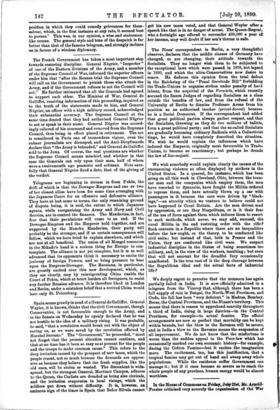The French Government has taken a most important step towards
restoring discipline. General Negrier, "Inspector" of one of the Eastern divisions of the Army, and a member of the Supreme Council of War, informed the superior officers under him that "after the Rennes trial the Sapreme Council will call on the Government to punish those who attack the Army, and if the Government refuses to act the Council will act." He further intimated that all the Generals had agreed to support each other. The Minister of War, General de Galliffet, receiving information of this proceeding, inquired as to the truth of the statements made to him, and General Negrier, an officer with a high military record, acknowledged their substantial accuracy. Tho Supreme Council at the same time denied that they had authorised General Negrier to act or speak in their name. General Negrier was accord- ingly relieved of his command and removed from the Supreme Council, thus being in effect placed in retirement. The act is considered in Paris one of tremendous vigour, even the calmer journalists are dismayed, and the Anti-Dreyfusards declare that " the Army is beheaded," and General de Galliffet sold to the Jews. Of course, the real questions are whether the Supreme Council means mischief, and whether in that case the Generals can rely upon their men, half of whom were a twelvemonth ago peasants and artisans. Note care- fully that General Negrier fixed a date, that of the giving of the verdict.


































 Previous page
Previous page